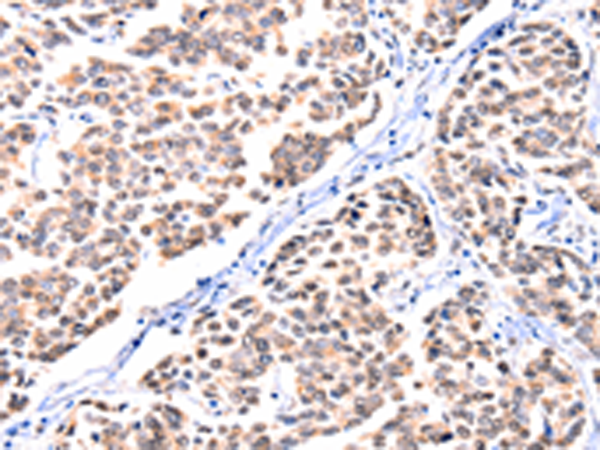

| WB | 1/500-1/1000 | Human,Mouse,Rat |
| IF | 咨询技术 | Human,Mouse,Rat |
| IHC | 1/50-1/100 | Human,Mouse,Rat |
| ICC | 1/50-1/200 | Human,Mouse,Rat |
| FCM | 咨询技术 | Human,Mouse,Rat |
| Elisa | 1/10000 | Human,Mouse,Rat |
| Aliases | FBLN, FIBL1 |
| Host/Isotype | Rabbit IgG |
| Antibody Type | Primary antibody |
| Storage | Store at 4°C short term. Aliquot and store at -20°C long term. Avoid freeze/thaw cycles. |
| Species Reactivity | Human |
| Immunogen | Synthetic peptide of human FBLN1 |
| Formulation | Purified antibody in PBS with 0.05% sodium azide and 50% glycerol. |
+ +
以下是3篇关于ZAP70抗体的参考文献概览:
---
1. **文献名称**: *ZAP-70 expression as a surrogate for immunoglobulin variable region mutations in chronic lymphocytic leukemia*
**作者**: Rosenwald A., et al.
**摘要**: 研究证明ZAP70抗体检测可作为慢性淋巴细胞白血病(CLL)患者中免疫球蛋白可变区(IgVH)突变状态的替代标志物,高表达ZAP70与疾病进展快、预后差相关。
---
2. **文献名称**: *Flow cytometric detection of ZAP-70 in chronic lymphocytic leukemia*
**作者**: Chan A.C., et al.
**摘要**: 开发了一种基于ZAP70抗体的流式细胞术检测方法,用于快速评估CLL患者的ZAP70蛋白表达水平,并与基因突变分析结果具有高度一致性。
---
3. **文献名称**: *ZAP-70 compared with immunoglobulin heavy-chain gene mutation status as a predictor of disease progression in CLL*
**作者**: Crespo M., et al.
**摘要**: 通过ZAP70抗体免疫组化分析,发现ZAP70表达水平较IgVH突变状态更能有效预测CLL患者的疾病进展风险,且检测方法更简便。
---
4. **文献名称**: *ZAP-70 deficiency as a novel cause of pediatric immunodeficiency*
**作者**: Elder M.E., et al.
**摘要**: 利用ZAP70抗体检测发现儿童免疫缺陷病例中ZAP70蛋白表达缺失,揭示了其与T细胞信号传导异常及严重联合免疫缺陷(SCID)的关联。
---
这些文献涵盖了ZAP70抗体在疾病机制、诊断技术及预后评估中的关键应用。
The ZAP70 (zeta-chain-associated protein kinase 70) antibody is a crucial tool in immunology and clinical diagnostics, primarily targeting the ZAP70 protein, a tyrosine kinase essential for T-cell receptor (TCR) signaling. Discovered in the 1990s, ZAP70 belongs to the SYK family of kinases and plays a pivotal role in activating downstream signaling pathways upon TCR engagement. Structurally, it contains two SH2 domains that bind phosphorylated immunoreceptor tyrosine-based activation motifs (ITAMs) on the TCR complex and a kinase domain that initiates signaling cascades for T-cell development, activation, and immune response regulation.
ZAP70 deficiency, caused by genetic mutations, is linked to severe combined immunodeficiency (SCID), characterized by dysfunctional T cells and recurrent infections. Diagnostically, ZAP70 antibodies are used in flow cytometry, Western blotting, and immunohistochemistry to assess protein expression, aiding in SCID diagnosis and differentiation from other immunodeficiencies. In oncology, ZAP70 expression in B-cell chronic lymphocytic leukemia (CLL) serves as a prognostic marker; its presence correlates with aggressive disease and poorer outcomes, guiding treatment stratification.
Antibodies against ZAP70 also facilitate research into T-cell signaling mechanisms, autoimmune diseases, and therapeutic target discovery. Their specificity enables precise detection of ZAP70's phosphorylation status and interactions, shedding light on dysregulated immune pathways. As both a biomarker and a research reagent, ZAP70 antibodies bridge basic immunology and clinical practice, underscoring their significance in understanding immune pathologies and advancing personalized therapies.
×